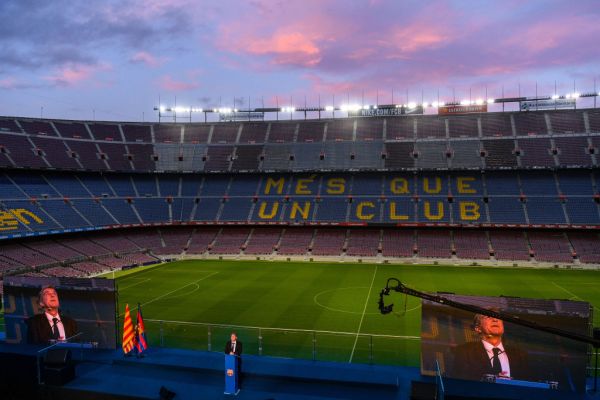Joan Laporta has repeatedly blamed his predecessor for the mess he inherited at Barcelona – and he’s completely right to do so.
Blaming your predecessor tends to be a cheap tactic. When deployed consistently, it is only justified if the predecessor in question is Donald Trump or Josep Bartomeu. Joan Laporta spent Monday reflecting on the mess he inherited. It was, the Barcelona president revealed, even worse than expected.
The large numbers at the Nou Camp had tended to revolve around Lionel Messi’s goalscoring feats. Now he is no longer around to deflect attention from the others: the €1.35 billion debt, the club’s negative net worth of €451 million, the losses of €481 million in the last year, the bridging loan of €80 million to pay salaries, the wage bill that is 103 percent of their income. And that is before factoring in the transfer fees paid for Philippe Coutinho, Antoine Griezmann and Ousmane Dembele, or the amount that – on paper anyway – Miralem Pjanic cost in a ludicrous swap deal.
“A terrible inheritance,” Laporta said, claiming repairs were required to the Nou Camp because it would otherwise have posed a risk to fans. He talked about “disproportionate” payments to agents, citing €8 million to one scout in South America, and “lies” that the previous regime had agreed wages cuts.
By ascribing a mere €91 million of the losses to the COVID-19 pandemic, Laporta illustrated that Barcelona have been the worst run club in world football. Their debts, therefore, would have been €1.26 billion without coronavirus. In the process, he inadvertently ought to have defeated part of the argument for the Super League: it was not needed for the good of the game. Barcelona only required saving from themselves, not the pre-lockdown wider footballing and financial landscape. The problem was Barcelona, not La Liga’s deal with CVC Capital Partners, whatever the rights and wrongs of it.
And, equally unintentionally, he illustrated how the broader complaints about the distorting impact of the clubs with billionaire backers or state support are no justification for Barcelona’s plight. It is undeniable that Paris Saint-Germain, Manchester City and Chelsea have had an influence on the transfer market and many an economic model. But that does not serve as an excuse for Barcelona.
Bayern Munich are not €1.35 billion in debt. Nor are Juventus or Liverpool or Lyon or Ajax or Borussia Dortmund. Every situation is different. Some have traded better than others and had more success on the pitch. Real Madrid’s debts, like Atletico Madrid’s, look far too high to be healthy but no one else got into a footballing arms race with such disastrous consequences.
Barcelona’s plight is all the more damning as, with the obvious exceptions of PSG, they received more Qatari money than most: first in a shirt sponsorship deal and then by receiving €222 million for Neymar. Barcelona squandered it and much more.
“They spent disproportionately and at lightning speed,” Laporta said. “This caused wages to skyrocket.” Those pay packets were so exorbitant that even in a pre-Covid world, Barcelona struggled to offload players; perhaps, were other clubs feeling more affluent, there may have been more possible takers for Coutinho and co, but probably not at the rate Barcelona paid them.
If Messi’s salary was the rising tide that lifted all other boats, it may have turned Barcelona into a sinking ship. And yet no one forced them to overpay everyone.
Indeed, Barcelona contrived to squander the windfall of developing much of an iconic team for a minimal outlay. Pep Guardiola reflected last week that he twice won the Champions League with seven graduates from La Masia in the starting 11, and while Gerard Pique had to be bought back, even that was cheap. Barcelona got the greatest player of his generation without a transfer fee and lost him because they could no longer afford to pay his wages. It was a consequence of catastrophic financial management.
Barcelona may have had the finest team of all time. Now, after one of the worst instances of overspending, they could have the biggest debts in footballing history. Now, as Barcelona are bankrupt, they have been the architects of their own crisis.
This article orginally appeared on FourFourTwoSA by Richard Jolly





